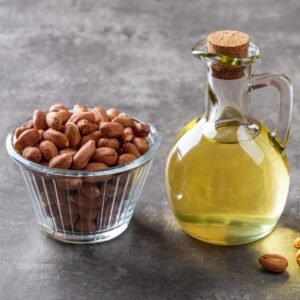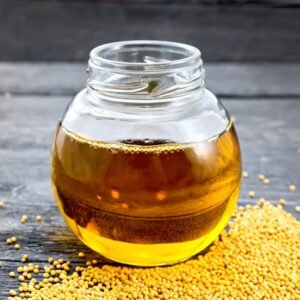Description
Types of Sesame Oil
There are mainly three types of sesame oil:
- Light Sesame Oil: Made from raw sesame seeds, this oil is light in color and has a milder flavor. It’s often used for both cooking and seasoning.
- Dark Sesame Oil: Extracted from roasted sesame seeds, this variety has a darker color and a deep, intense flavor. It’s mainly used as a finishing oil to add flavor to dishes just before serving.
- Cold-Pressed Sesame Oil: Produced by mechanically pressing sesame seeds, this oil retains most of its nutritional properties because it isn’t exposed to heat during extraction. It’s usually more expensive than other types.
Nutritional Benefits
Sesame oil is rich in unsaturated fats, particularly polyunsaturated and monounsaturated fats, which are beneficial for heart health. It also contains sesamol and sesamin, powerful antioxidants that protect the body from oxidative stress. As a good source of vitamin E, sesame oil can boost skin health too.
Culinary Uses
In cooking, sesame oil is used for its distinctive flavor rather than its ability to withstand high temperatures, making it more suitable as a seasoning or finishing oil. Its strong flavor profile stands up well in stir-fries, soups, and marinades. Dark sesame oil is particularly popular in Korean and Chinese dishes, while the lighter variety is commonly used in Middle Eastern and Indian cuisines.
Possible Allergenic Properties
Although sesame oil is relatively less allergenic compared to whole sesame seeds, some people diagnosed with a sesame allergy may react to the oil. Those with known sesame allergies should avoid consuming it in any form until a tolerance test is conducted under the observation of a medical professional.
Environmental Impact and Sustainability
The environmental impact of cultivating sesame seeds largely depends on farming practices. On the one hand, sesame is a drought-tolerant plant and requires less water than many other crops. However, the use of pesticides and synthetic fertilizers can affect the soil and surrounding environment negatively.
In conclusion, sesame oil brings a robust flavor and several health benefits to the table. As with all oils, it’s best used in moderation as part of a balanced diet.




Reviews
There are no reviews yet.